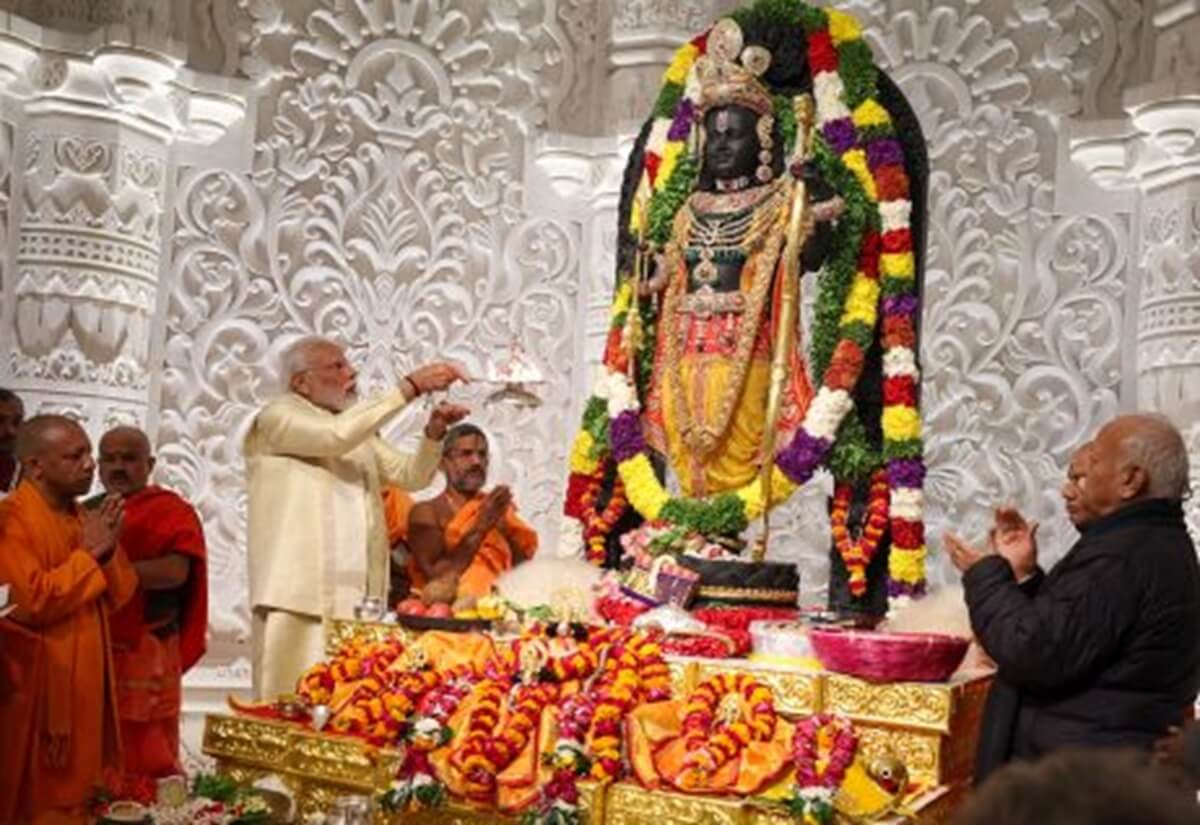With Ram Temple Consecration, How BJP has Undone Nehru, Ambedkar’s Legacy — and Damaged The Constitution
D. Raja | 28 January 2024
The very republic is mandated by the Constitution to separate itself from religion. People’s faith has been weaponised by the RSS-BJP combine in pursuit of a vengeful vision of India
Replacing the colonial Government of India Act, 1935, the Indian Constitution formally came into effect on January 26, 1950. That day declared to the world and to its own citizens that India chooses to be a modern, secular, democratic, republic embodying the universal ideals of liberty, equality, and fraternity. Yet, in 2024, the Republic Day that commemorates the genesis of modern democratic India comes days after the Ram temple consecration event in Ayodhya, blessed by the ruling dispensation, the Prime Minister and the entire Cabinet.
Moving across the national capital, one is inundated with saffron flags etched with Ram’s pictures, in many places as a replacement for the tricolour — the fulfilment of one aspect of the political project of the SanghParivar. Looking at India in 2024, B R Ambedkar would have been deeply worried at the irreparable impairment done to its constitutional vision. The Ram temple consecration being led by the head of the government is a move intended to unravel secularism from the tapestry of the constitutional values that have sustained India as a democracy in progress. Hinduism, marked and built around the idea of hierarchy in the form of graded inequality, is fast replacing the fundamental tenets of our Preamble. “We the people” are sought to be segregated and otherised by the immense might of the state.
The demolition of the Babri mosque, in the words of the Supreme Court, was executed by egregiously violating the rule of law. After that violation, India is now witnessing the breach of a sacred line. The very republic is mandated by the Constitution to separate itself from religion. People’s faith has been weaponised by the RSS-BJP combine in pursuit of a vengeful vision of India.
A little history lesson is useful here. When Somnath temple was being consecrated, Prime Minister Jawaharlal Nehru, C Rajagopalachari, and S Radhakrishnan reached out to the then President of India Rajendra Prasad not to attend the consecration ceremony. Nehru specially wrote to Prasad that there was no problem if the President of India visited any shrine but cautioned that his visit to a special event like the consecration ceremony would, in effect, come to mean the lending of state’s legitimacy and subscription to one particular religion, setting an unfair and dangerous precedent. Prasad claimed that he would participate in his personal capacity and not as President of India. However, Nehru, Rajagopalachari, and Radhakrishnan made it clear that none would accept the narrative that the office of the President of India can be separated from his personal capacity in the context of special religious functions. In this Naya Bharat, this distinction doesn’t matter.
Plotting through this disregard for the Constitution, Modi continues to pay lip service to Ambedkar. There remains an attempt to reduce Ambedkar to being an empty signifier by decoupling him from his ideas of equality, justice, and emancipation. Ambedkar, in his draft Constitution, provided that the state would have no religion and any call for comprehensively boycotting minorities in India would be treated as a cognisable offence. He also prescribed in the draft that the future legislature of India would have to frame a law for stringently punishing those who would commit the crime of leading people to boycott minorities from social and economic domains. Ambedkar would have been disturbed to see the sense of justice of the state so compromised. For, it was Ambedkar who said that the cultivation of constitutional morality by citizens was imperative for the success of the working of the Constitution itself. Yet, under the aegis of this regime, we are witnessing a reversal.
The government wilfully ignores the anti-imperialist, anti-feudal history of the Subcontinent and replaces it with myths, wishful claims, and unscientific temperament. Here it is worthwhile to recall Ambedkar’s call to the people of the nation to resist and fight against the calamity of the Hindu Rashtra. Some revel in empty signifiers of statues, temples, life-size banners, beautification of the city by physically covering up the poor and their dwellings, changing the name of cities, and peddling pseudo-science and history. On the other hand remain those who continue to raise fundamental and objective concerns regarding record high unemployment, the commodification of education, increasing brute as well as institutionalised violence against women, especially Dalit and Adivasi women, decrease in women’s workforce participation, accelerated gig-ification of employment, and the theft of commons. Time and history are pressing upon all to mobilise our collective will and political courage, to uphold the constitutional fabric of our country.
The writer is general secretary, CPI
This article was originally published on The Indian Express.
Views in this article are author’s own and do not necessarily reflect CGS policy.
